Ozaki grabs Paris ticket at 68kg with thrilling win over Ishii
Sunday, January 28, 2024 - 02:51 By Ken Marantz

TOKYO (January 27) -- Ever since she started wrestling as a schoolgirl, the single-leg takedown has been Nonoka OZAKI's most reliable weapon. It didn't let her down when she needed it most -- with a ticket to the Paris Olympics on the line.
Ozaki launched a last-ditch single-leg in the final nine seconds and it paid off with a takedown, giving the two-time world champion a dramatic 5-4 victory over Ami ISHII in a playoff for Japan's spot in Paris at women's 68kg on Saturday at Tokyo's National Training Center.
"I'm really happy, but it still hasn't sunk in that I've taken a step closer to my dream," said a jubilant Ozaki, for whom the road to Paris has been a roller-coaster of emotions.
Ozaki was the 2022 world champion at 62kg, but missed out during the domestic qualifying process for Paris in that weight class. She then decided to take a shot at 68kg when that became her only remaining option.
Ozaki set up the playoff with Ishii by winning the 68kg title at the Emperor's Cup All-Japan Championships last December. Ishii, the world silver medalist in 2022, had finished fifth at last year World Championships in Belgrade -- good enough to secure a Paris berth for Japan but not enough to fill it herself.
The victory gave Ozaki her fifth win in five career meetings between the two, who are only three months apart in age. The older Ishii turned 22 in December. Ozaki threw down the gauntlet in their most recent clash, defeating Ishii 6-2 in the first round of the Emperor's Cup.

On Saturday, Ishii looked like she might have finally found an answer. Trailing 3-0 in the second period, she received a passivity point, then broke through Ozaki's defenses to score a takedown at the edge in the final seconds that was upheld in an unsuccessful challenge (the Ozaki side wanted it called a stepout) to take a 4-3 lead.
"She got the points in the last 10 seconds and I thought for a moment all was lost," Ozaki said. "During the challenge, I thought, 'I don't want the match to end this way.' Those on my side had a look on their faces of 'you can still do it.'...There was nothing left but to go for it."
During the challenge, the mat chairman also had the clock reset from four seconds and change to 9.89. Ozaki wasted none of it, lunging for the single-leg and quickly finishing it off with a few seconds to spare.
"I didn't practice that, shooting right off the whistle, but I believed in myself," Ozaki said. "It was good they put the clock back to 10 seconds, if it was four seconds, it would have been a problem. I can't say I was calm, but there was nothing else to do. The fact that I didn't have time to think, 'What should I do?' was a good thing."
Ozaki also cut it close with her first-period takedown, which she scored with six seconds left off a counter that she said she practiced in preparation for the match. Ishii likes to work an underhook, and as soon as she made a move for a leg, Ozaki dropped down and clamped on her head, then used her speed to spin behind.

For Ishii, the agony of defeat was excruciating. In disbelief, she dropped to the mat and sobbed uncontrollably, which continued even after she was escorted by teammates off the mat. Her wails of anguish reverberated throughout the room, in contrast to Ozaki's celebrations with her contingent.
The playoff was held on one of the six mats in the spacious wrestling room on the basement floor of the National Training Center. Aside from a smattering of media and federation officials, each wrestler was accompanied by a small contingent of fans or teammates.
Ishii just could not seem to process what had happened. Speaking in a barely audible voice through tears to the media, she said, "It's like someone you know has died, but you don't feel like they're gone. I don't feel like Paris is gone, but I have to accept that it is."

Ozaki could commiserate with her vanquished opponent. She had been on the losing end in a battle for the 62kg place with Ishii's Ikuei University teammate Sakura MOTOKI, a 2022 bronze medalist at 59kg who moved up to the Olympic weight and made it hers. (Another Ikuei wrestler, world champion Tsugumi SAKURAI, will be going to Paris at 57kg.)
"This is a world of competition, and I came here to get the ticket [to Paris] also," Ozaki said. "I know how much she wanted to win, but the competition is harsh and one of us has to lose. I won in the last few seconds, but that could have gone either way. I could have just as easily lost. I am grateful to her for giving me such a high-level match."
Ishii had won the world silver at 68kg in 2022 and could have locked up her place in Paris with a repeat performance last year in Belgrade. The Japan federation had decreed that any wrestler who won a medal in an Olympic weight class would automatically fill the Paris berth themselves.
As it turned out, 68kg was the only women's weight class out of the six in which the Japanese entry did not medal.
Sadly for Ishii, an 8-8 loss in the bronze-medal match to Irina RINGACI (MDA) had dire consequences. Ishii would win the fifth-place playoff to secure the Paris berth for Japan, but it left the door open for others to poach.
Ozaki was also in Belgrade, having decided that she needed to move forward and put her failure at 62kg behind her. She won a spot on Japan's team at the non-Olympic weight of 65kg and picked up her second world gold. But her heart was hardly into it. Of more concern was seeing Motoki clinched her place in Paris by winning the 62kg silver.
"When I look back, it's enough to make me cry, it was so tough," Ozaki said. "Right now I'm happy, but up to last year's World Championships, there was no joy at all in my life. It's like the person I was up to then was lost, it was someone I didn't know like I had run into a wall. I wanted to fight hard but I couldn't make the effort.
"I thought that I don't even want to watch a Paris Olympics that I'm not in. When I won the 65kg playoff here, I had convinced myself that I had to keep moving forward. It wasn't an Olympic weight, but I thought if I could be No. 1 in the world again, it would be an opportunity to start over.
"That's how I felt going to the World Championships. But before my final, the 62kg [berth] was secured. I didn't take a victory lap and I was crying -- it makes me cry now to recall this -- because I was thinking, 'The Olympics is over for me.' I felt resentment. But as I told the media, I was the one responsible and had to accept it. 'I'm not going to retire, and I'll keep fighting,' I said. I had never thought that in the end, I would be going to the Olympics at 68kg."
 Ikuei University teammates try to console a devastated Ami Ishii. (Photo by Ken Marantz / United World Wrestling)
Ikuei University teammates try to console a devastated Ami Ishii. (Photo by Ken Marantz / United World Wrestling)
Less than two years ago, Ozaki was on top of the world at 62kg, having won 2022 world golds on the senior, U23 and U20 levels over two months. Her eyes were firmly on Paris, and the Japanese press buzzed over her budding rivalry with Tokyo Olympic silver medalist Aisuluu TYNYBEKOVA (KGZ).
But her well-laid plans began to unravel just a few months later when Motoki decided to make a challenge for the Olympic spot at 62kg in a field that included Tokyo Olympic champion Yukako KAWAI.
After Motoki won their clash at the Emperor's Cup, they never got to meet in the second qualifier -- the Meiji Cup All-Japan Invitational Championships in June 2023 -- as Ozaki was handed a stunning 6-6 defeat in the quarterfinals by Yuzuku INAGAKI. Motoki won the title to clinch the ticket to Belgrade, and the rest is history.
In preparation for Paris, Ozaki plans to enter one tournament at 68kg, the Asian Championships in Bishkek in April. She is also carrying some injury concerns, having hurt her right knee at the Emperor's Cup and having problems with her left thumb for the past year which she says affects her grip.
But that is all secondary to having made it to the Olympics, even if it means facing opponents larger than she is accustomed to.
"A year ago, I would never have thought of taking the path of 68kg," Ozaki said. "I'm still only 66 kilograms, but I'll work to fill out to 68. Without being inferior in strength, I will use my speed to my advantage. I'll work on counters for underhooks and throws, and maybe even be able to hit some throws of my own. I'll continue to make progress and I'll be ready."
Ozaki, a product of the JOC Academy, took the academic route when it came to choosing a college and currently attends the prestigious Keio University. That means that outside of national team camps, she has to hit the road for training. Her preparation for the playoff took her to Kanagawa University, a club team in Kanagawa Prefecture and a high school in Yamanashi Prefecture. Several of the male wrestlers at the latter were on hand Saturday.
Whether she can win the gold will likely come down to how effective her old friend, the single-leg tackle, will be for her.
"That tackle has been a part of everything I've accomplished up to now," Ozaki said. "It's my weapon, one that I believe in completely. I've always relied on it and won with it. I owe a debt of gratitude to the technique."
Japan's Paris-bound women
50kg: Yui SUSAKI (world champion)
53kg: Akari FUJINAMI (world champion)
57kg: Tsugumi SAKURAI (world champion)
62kg: Sakura MOTOKI (world silver medalist)
68kg: Nonoka OZAKI (world champion 65kg)
76kg: Yuka KAGAMI (world champion)

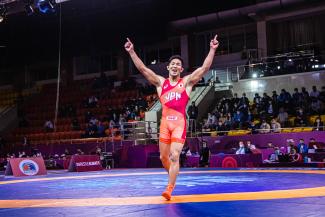
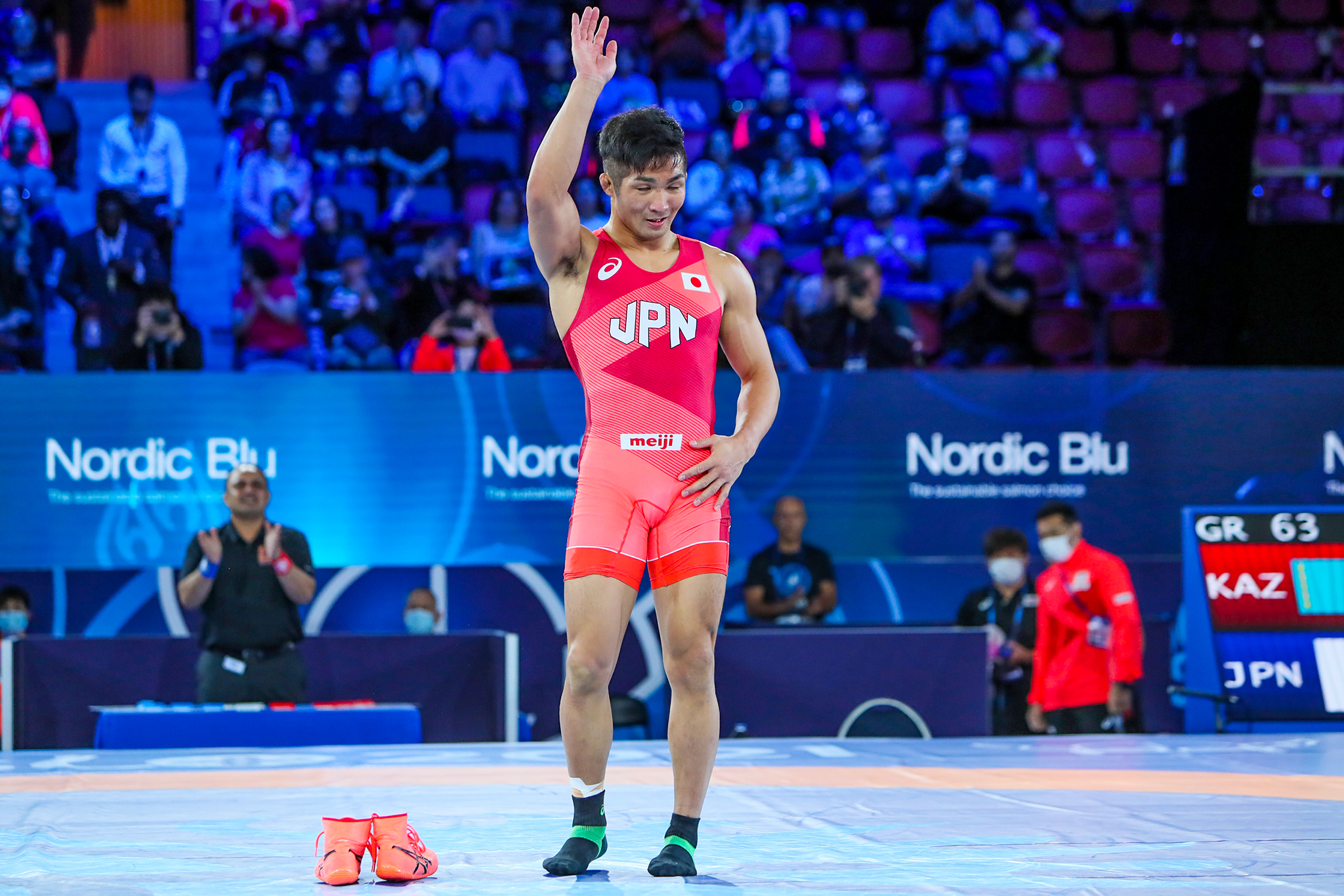 Tsuchika SHIMOYAMADA (AUS) had left his shoes on the mat during the 2021 World Championships to mark his retirement. (Photo: United World Wrestling / Martin Gabor)
Tsuchika SHIMOYAMADA (AUS) had left his shoes on the mat during the 2021 World Championships to mark his retirement. (Photo: United World Wrestling / Martin Gabor)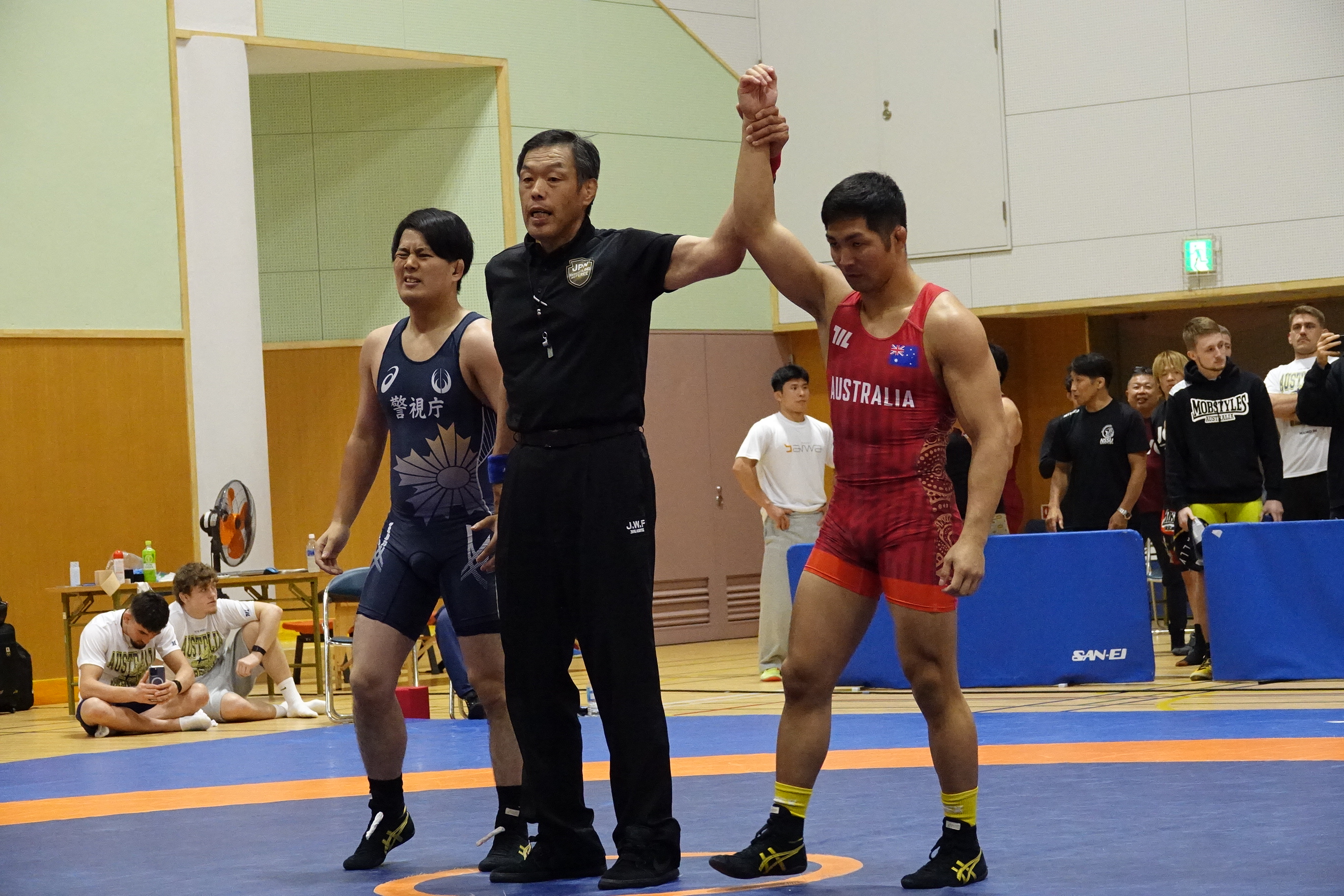 Tsuchika SHIMOYAMADA advances to the semifinals at the All-Japan Non-Student Championships in July with a 52-second win over Kokoro GOTO. (Photo: Koji Fuse / wrestling-spirits.jp)
Tsuchika SHIMOYAMADA advances to the semifinals at the All-Japan Non-Student Championships in July with a 52-second win over Kokoro GOTO. (Photo: Koji Fuse / wrestling-spirits.jp)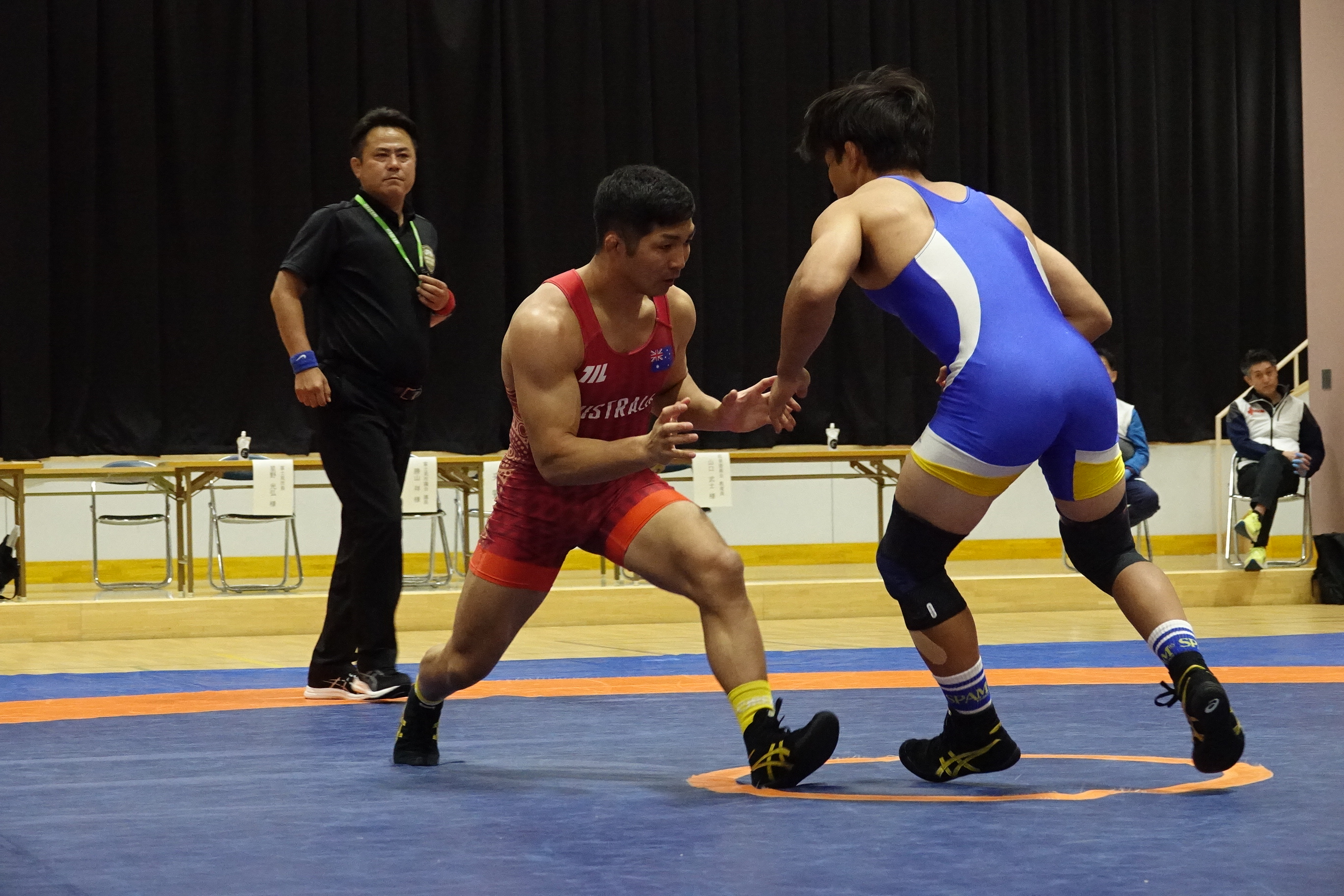 Tsuchika SHIMOYAMA faces Keitaro ONO in his opening match at the All-Japan Non-Student Championships in July. (Photo: Koji Fuse / wrestling-spirits.jp)
Tsuchika SHIMOYAMA faces Keitaro ONO in his opening match at the All-Japan Non-Student Championships in July. (Photo: Koji Fuse / wrestling-spirits.jp)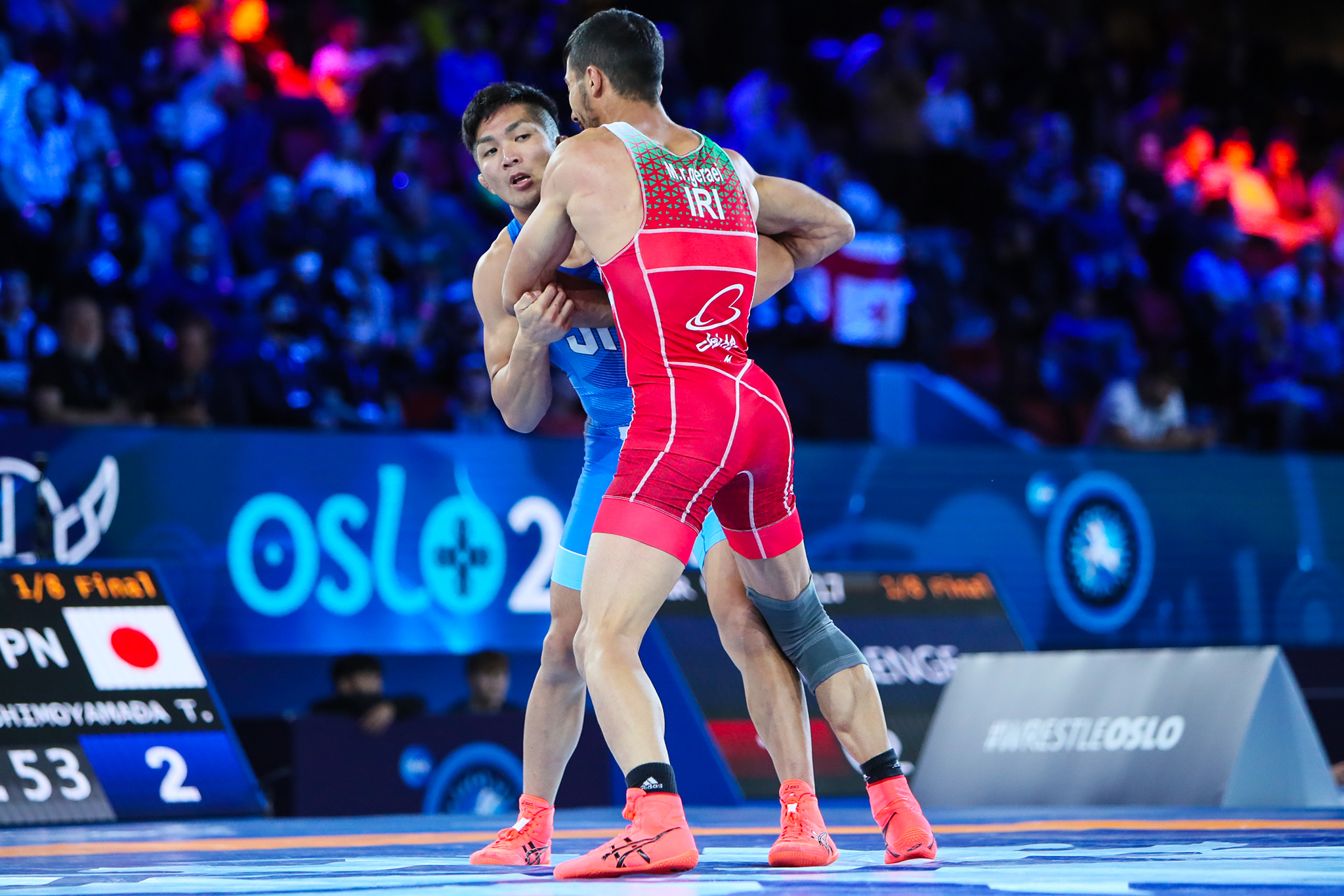 Tsuchika SHIMOYAMADA (AUS) was dominating Mohammadreza GERAEI (IRI) in their match at the 2021 World Championships before being pinned. (Photo: United World Wrestling / Martin Gabor)
Tsuchika SHIMOYAMADA (AUS) was dominating Mohammadreza GERAEI (IRI) in their match at the 2021 World Championships before being pinned. (Photo: United World Wrestling / Martin Gabor)
Share your thoughts.
Comments